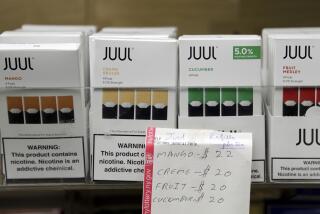Big Tobacco, Minnesota Negotiating, Sources Say
- Share via
Tobacco industry lawyers have been meeting with representatives of the Minnesota attorney general’s office in an attempt to negotiate a settlement of the state’s massive case against the cigarette companies, according to several sources familiar with the talks.
However, the sources cautioned that no deal is imminent in the case, which may go to the jury as early as the end of next week.
Several sources, including Eric Johnson, chief aide to Minnesota Atty. Gen. Hubert H. Humphrey III, scoffed at a prediction by prominent cigarette analyst Gary Black at Sanford C. Bernstein & Co. that the case would be settled by early next week.
“Black’s been predicting a settlement for months, and he’s been dead wrong. . . . He’s not going to put Jeane Dixon out of work,” Johnson said.
Johnson refused to confirm or deny that talks were taking place. Industry spokesman Scott Williams said he was unaware of any negotiations.
Several attorneys who have followed the tobacco wars closely said that although there are advantages to both sides in settling, it would be very difficult for the industry to meet Minnesota’s particularly tough demands.
Especially troublesome is a “most-favored nations” clause in settlements the industry reached earlier with Mississippi, Florida and Texas. Those clauses provide that if the industry settles with any state subsequently and gives it more favorable terms, then the states that settled earlier get the same benefits.
Minnesota and Blue Cross / Blue Shield of Minnesota are seeking $1.77 billion in damages to compensate them for money expended treating sick smokers. The state is suing for additional damages based on alleged violations of the state’s antitrust and consumer protection laws.
Several experts, including Columbia University law professor John C. Coffee, said the industry fears getting hit with a whopping punitive damage judgment in Minnesota because that would increase the chances of Congress passing stiff legislation against the industry.
Indeed, one tobacco lawyer said that the general view inside the industry is that the best the cigarette companies could hope for in Minnesota is a hung jury.
Still, juries can be unpredictable, and for Humphrey, a key reason to settle would be to avoid the risk of an adverse verdict in the midst of his heated race for governor.
On Wednesday, Johnson reiterated Humphrey’s long-stated position that three conditions would have to be met in order for the state to settle: “full disclosure of the truth,” meaning the release of all internal industry documents; “an ironclad ban on marketing to children”; and “damages commensurate with the harm the industry has caused.”
As a result of Minnesota’s suit, Humphrey prevailed on the document issue because the industry has been forced to surrender millions of internal documents, including thousands it waged a yearlong battle to keep secret.
Black predicted that the case would settle for $4.5 billion to $5 billion. But several attorneys, including Richard Daynard of the Tobacco Products Liability Project in Boston, said they could not imagine that low a settlement. Minnesota would have gotten $4.2 billion under a proposed grid that was formulated by state attorneys general after the proposed $368.5-billion national settlement was announced last June.
However, pending legislation in Congress has upped the total pot to $516 billion. Minnesota and its private attorneys have spent considerable time and resources unearthing industry secrets that clearly would help future industry legal foes, so the state clearly would be entitled to ask for a lot more than it would get under the grid, several sources said.
The industry could attempt to get around this problem by paying Minnesota more money in total or a greater payment upfront as part of a long-term settlement. Additionally, Big Tobacco could try to meet Humphrey’s demand on youth smoking by agreeing to so-called look-back payments--stiff penalties that would be imposed if teen smoking rates did not drop dramatically in a few years.
However, if the industry gave Minnesota either of those terms, then the states that already settled would demand equal treatment and those conditions would become the floor in any future negotiations with other states, Daynard said.
* MORE TOBACCO SUITS: Blue Cross and Blue Shield in 38 states sue tobacco firms. A1
More to Read
Sign up for Essential California
The most important California stories and recommendations in your inbox every morning.
You may occasionally receive promotional content from the Los Angeles Times.













